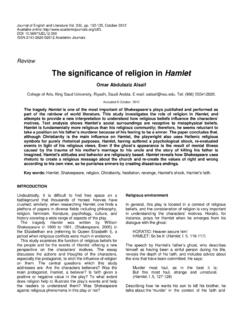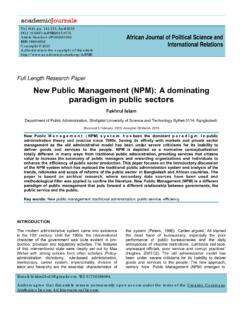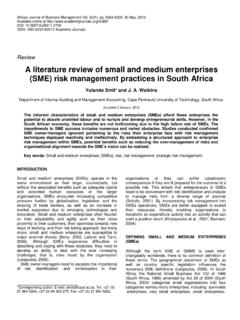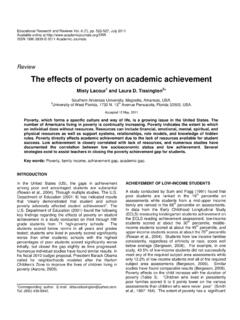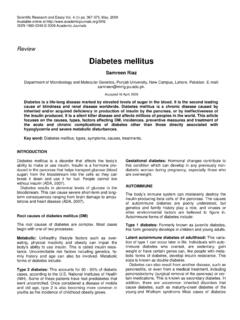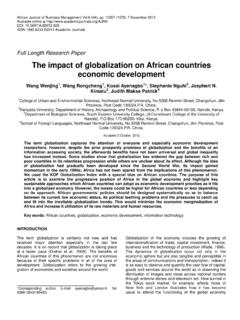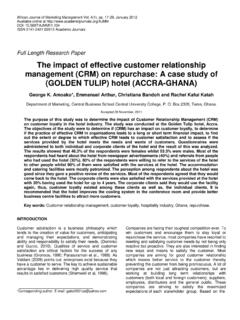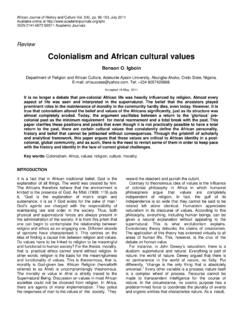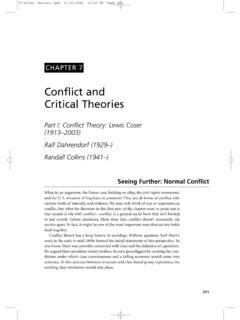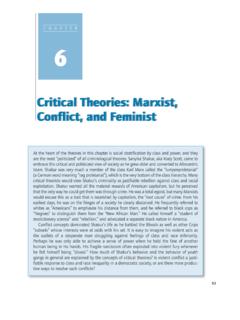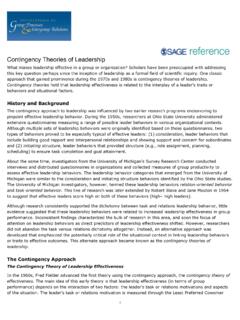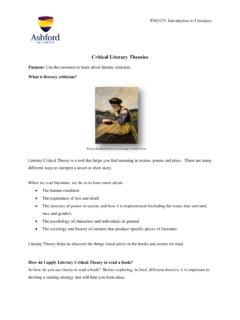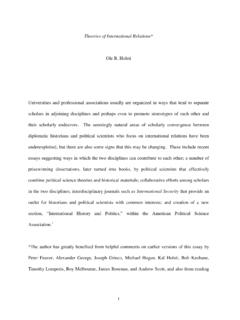Transcription of A critique of modernization and dependency theories in ...
1 African Journal of History and Culture Vol. 3(5), pp. 65-72, June 2011. Available online at ISSN 2141-6672 2011 Academic Journals Review A critique of modernization and dependency theories in Africa: critical assessment J. Matunhu Department of Development Studies, Midlands State University, Zimbabwe. E-mail: Accepted 6 April, 2011. The way states and development specialists rationalize how to commit economic resources to development is influenced, to a greater extent by their level of persuasion towards specific development theories . The discourse assesses the influence of modernization and dependency theories on Africa's development. The conclusion is that both theories have failed to help develop Africa. The discourse pins hope on the African Renaissance theory of development. Key words: modernization , dependency , rural underdevelopment, African renaissance. INTRODUCTION. Africa houses plentiful economic resources.
2 Agriculture modernisation process involves encouraging Paradoxically, the continent languishes in poverty as farmers to try new crops, new production methods and evidenced by high prevalence of famine, disease and new marketing skills (Ellis and Biggs, 2001). In general, ignorance (Buthelezi, 2007). This presentation attributes modernization led to the introduction of hybrids, the green the poverty to theories of development because the way house technology, genetically modified (GMO) food, use society deals with underdevelopment is influenced by of artificial fertilizers, insecticides, tractors and the development theories . The presentation assesses the application of other scientific knowledge to replace effect of modernity and dependency theories on Africa's traditional agricultural practices. development and concludes by recommending the The above view is endorsed by Smith who pointed out adoption of the African Renaissance theory to Africa's that modernisation is about exchanging of older agricul- development.
3 In this presentation, development is viewed ture practices with something more recent (Smith, 1973: as a gradual transition of society to a strong socio- 61). Agriculture societies can therefore be regarded as economic status. In a sense, development entails an modern when they display specific characteristics. The improvement in quality of human life. Some of the extent to which these characteristics are exhibited gives indicators of a good quality of life are low infant mortality an indication of the degree of modernity that has been rate and a longer life expectancy. reached. The characteristics are cited succinctly by Coetzee et al. (2007: 31) as: THE MODERNISATION THEORY OF DEVELOPMENT (i) Readiness to accommodate the process of transformation resulting from changes. The modernization the movement of the 1950s and (ii) Continuous broadening of life experiences and 1960s is an economic theory that is rooted in capitalism.
4 Receptiveness to new knowledge. The concept of modernization incorporates the full (iii) Continuous planning, calculability and readiness spectrum of the transition and drastic transformation that towards new experiences. a traditional society has to undergo in order to become (iv) Predictability of action and the ability to exercise modern (Hussain et al., 1981; Lenin, 1964). Modernisa- effective control. tion is about Africa following the developmental footsteps (v) High premium on technical skills and understanding of of Europe (largely the former colonizer of Africa). the principles of production. According to modernity, policies intended to raise the (vi) Changing attitudes to kinship, family roles, family size standard of living of the poor often consist of and the role of religion. disseminating knowledge and information about more (vii) Changing consumer behavior and the acceptance of efficient techniques of production.
5 For instance, the social stratification. 66 Afr. J. Hist. Cult. Notably, modernisation strategies and policies are West into Africa that brought about a paradigm shift on common to both the pre and post-colonial states in Africa. how Africa should develop. The West desired to change On their arrival in Africa, whites tasked themselves with Africa's development course in favour of theirs. The the responsibility of modernizing the continent. No enlightened then tasked themselves with the responsi- wonder why they labeled Africa as dark continent which bility of developing Africa along a new course. They needed to be enlightened (modernized). It is the claimed that Africa's development had to pass through enlightenment idea that motivated Cecil John Rhodes distinct stages. The Rostowian theory identifies the and his entourage (composed of missionaries, engineers, stages as: farmers etc) to settle in Africa.
6 It is also part of the reason why Rhodes' British South Africa Company (BSAC) 1. Primitive society: The stage is characterized by embarked on the mission to build a road from Cape of subsistence farming and barter trade. Good Hope in South Africa to Cairo in Egypt. The form 2. Preparation for take-off: The characteristics of the and strategies for Africa's development have always stage are; specialization, production of surplus goods and been changing in light of the changes in technological trade. Transport infrastructure is developed to support and ideological views of the developed world. The then trade. The stage encourages savings and investment United States of America (USA) president Harry 3. Take-off: At this stage industrialization increases and Truman's January 20, 1949 presidential inaugural the economy switches from agriculture to manufacturing. address captured these sentiments: 4.
7 Drive to maturity: At this stage the economy diversifies into new areas and there is less reliance on imports. We must embark on a bold new programme for making 5. Period of mass consumption: At this stage, the the benefits of our scientific advances and industrial economy gears on mass production and service sector progress available for the improvement and growth of becomes increasingly dominating. underdeveloped areas. The old imperialism- exploitation for foreign profit- has no place in our plans .. (Allen and With the above scheme, it is possible to plot African Thomas, 1992: 06) . nations on the linear development path. The above view is rather too theoretical. Most economies in Africa invest Apparently, the responsibility of developing Africa is in agriculture, manufacturing and tourism. It is therefore placed in the custody of the metropolitan states. The not easy to classify economies into neat categories as metropolis implicitly or explicitly implied that sub-Saharan suggested by the Rostowian linear development theory.
8 Africa's development was lagging far behind other The linear development paradigm is also shared by regions of the world because of the obvious innate' Gabriel (1991) who argues that the basic argument of the inferiority of black people to master the socio-economic movement to modernity is related to the increase in the and technological environment in order to improve their so called modern values of production such as automa- social and economic conditions. The above view by the tion, the use of computers, specialization, and application proponents of modernity is malicious and misdirected. of science in production of economic goods and services. Rodney (1972) in his book How Europe underdeveloped Modernity theorists believe that nations advance to Africa clearly demonstrates that in the fifteenth century modernity at different paces depending on their (period of first encounter between Europeans and adaptability and versatility.)
9 There is an element of truth in Africans), the continent had already established empires the above idea. However, it must also be appreciated that in the East, Central, West, and South of the continent. wars, conflict, natural disasters and pandemics may force The empires of Mali and Songhay in West Africa, poor countries to move back and forth on their way to Tshaka in Zululand, Mossi to the East of Mali and the development. The recent devastating political conflict in kingdom of Dahomey in the central part of Africa where Zimbabwe and the current conflict in Libya and Sudan some of the most powerful in wealth and territorial have robbed the nations of their development gains. The expansion (Rodney, 1972). The economies of the above above idea demonstrates that the road to development is states were composed of farmers, artists (gold and silver not always smooth, it has ups and downs.
10 Smiths, weavers, wood carvers, cloth makers, medicine Modernists erroneously present the development men experts in naturopathy), and sculptors of wood, theory as a dichotomous movement from an original iron and terracotta. The economies had advanced terminal situation to an achieved situation with the help of methods of preserving food. Samir et al. (1987) and the developed countries as Sachs (1992:1) writes: Rodney (1972) claim that the economies in Africa used advanced African technology and techniques. The above Like a towering lighthouse guiding sailors towards the revelation shows that before the first encounter with the coast, development stood as the idea which oriented Eurocentric ideas to development, Africa had already emerging nations in their journey through post war history founded its path to development.. the countries of the south proclaimed modernization The arrival of the Portuguese in Africa in 1444 had an as their primary aspiration after they had been freed from influence on Africa's development.
